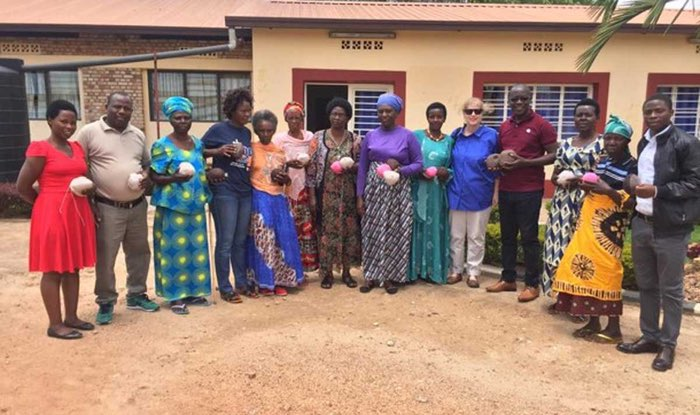
Balinda (4th from right) poses for a picture with patients and some medical staff during the launch of a support group in Rwamagana district
By Hudson Kuteesa
When 65-year-old Athanasie Mukabitega, a resident of Nyagatare, a far northeast district of Rwanda, was diagnosed with stage three cervical cancer, she was deeply distressed.
Not only was the disease frightening in itself – some 67% of the approximately 1,200 women diagnosed with cervical cancer in Rwanda each year die of the disease – but accessing the treatment she needed was a struggle. She had no transportation, and no children at home to support her.
“At some point, I almost gave up, and considered quitting treatment,” she says. While her cancer therapy was provided free of charge at the Butaro Cancer Centre of Excellence, Rwanda’s main cancer treatment facility, she needed more than medical care. She needed emotional support.
“Then God sent Mr Balinda and his wonderful team, who have done so much for me. Through their group, we hold discussions at the treatment centre. These conversations restored my mental health and gave me hope,” she recalls.
Mukabitega says she is responding well to treatment, and her bleeding has stopped. She has now been referred to the Rwanda Military Hospital (RMH) in Kigali, where she will still benefit from the same group of health professionals and is lodging at a facility built for patients travelling from faraway places.
Balinda finds his way
“Mr Balinda” is Jean Paul Balinda, 52, a nurse and public health professional with a master’s degree in public health. He is also the founder of the Women’s Cancers Relief Foundation, a Rwandan NGO, through which he and his team advocate for the early detection of women’s cancers, particularly cervical and breast cancer, and better access to affordable care.
His story with the foundation began in 2018. He was working with the Rwanda Biomedical Centre (RBC) on the national cancer programme, and says that during that time, he recognised significant gaps in patient support. Patients receiving treatment were often not followed up at home, and faced numerous challenges, including stigma, and psychological and financial struggles.
The weight of those challenges became clear to him even earlier. In 2015, he recalls, he was taking part in a training session for healthcare providers in Musanze, a northern district of Rwanda, when a fellow nurse approached him during the break and showed him her breast, with symptoms of cancer.
“I asked her, ‘As a healthcare professional, why do you see these abnormal symptoms and stay silent?’ She explained that her husband, a soldier, wouldn’t allow her to seek treatment,” Balinda recalls.
He decided to do something about the situation. He reached out to a colleague at the Rwanda Military Hospital and told him about it. The colleague, being a top official at the military hospital, used his position to speak to the nurse’s husband.
Fortunately, the husband accepted the advice and allowed the wife to go for a medical examination. She was subsequently diagnosed with breast cancer, underwent a mastectomy, and started chemotherapy.
“Today, she is doing fairly well,” Balinda says. But there are many women who have faced similar barriers, ranging from stigma and lack of knowledge to logistical challenges, he says – and it is that which prompted him to establish his foundation.
Group support: crying – and laughing – together
While visiting Butaro Cancer Centre, he noticed that there were informal meetings among patients, in which they shared their health struggles. He admired the idea, and sought to formalise these sessions, combining knowledge-sharing from medical personnel with emotional and financial support.
Subsequently, he organised the first counselling session for a small group of patients, giving them space to express their emotions. “I gave them time to cry and then to laugh,” he says.
“When a new patient meets someone who has survived for more than five years, it gives them hope,” he says. “When they see someone who has lost their hair but has since regrown it, they know they can survive too, which helps them stick to their treatment.”
The number of participants in the meetings grew, with women coming from various parts of Rwanda, including Kigali, Muhanga and Musanze. Seeing his initiative vindicated, Balinda went a step further, registering the project as the Women’s Cancers Relief Foundation.
The foundation now operates in districts such as Muhanga, Musanze, Rwamagana, Huye and Burera, where women gather to speak with healthcare professionals and support one another. “These support groups are led by local nurses who are trained in breast and cervical cancer. They provide information and offer a safe space for women to comfort each other,” Balinda explains.
Support beyond words
In addition to emotional support, the foundation has also helped patients deal with their needs, including lodging and transportation while undergoing treatment. Balinda says they do this with support from partners.
The organisation’s accommodation facility in Kigali is of importance to patients travelling long distances for treatment, allowing them to rest after undergoing medical care, before they return to their homes.
Prevention is key, vaccines are needed
Balinda emphasises that cervical cancer is now preventable, pointing to the importance of vaccination.“That’s why the government decided to avail HPV vaccines for every girl between 9 and 15,” he says.
The government began rolling out the cancer-blocking jabs in schools as early as 2011, and secured Gavi, -the Vaccine Alliance-, support for the programme in 2014. According to RBC, as of 2022, 90% of girls aged 15 had been fully vaccinated, reaching a major milestone on the road to the 2030 cancer elimination target.
It is important to maintain that momentum. Vestine Rugema, a volunteer with the foundation and site coordinator for support meetings in Burera, says, “We want to use the voices of cervical cancer survivors to encourage parents to vaccinate their daughters.” (End)
